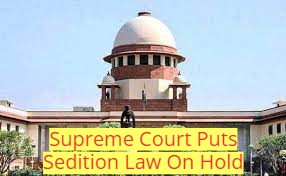

By Sunil Garodia
First publised on 2022-05-11 14:47:34
The
government thought it was being smart when, after the Supreme Court toughened
its stand on its delaying tactics in the sedition case and gave it three days
to come up with its final response after which it said that it would pass
orders in the case, it made a U-turn and told the court that it was ready to
get Section 124A re-examined by an appropriate authority as mandated by the
Constitution to insert safeguards to prevent its misuse. It thought it would
then get ample time to put forward something concrete before the court to let
the section stay in the statute books as the court was unwilling to issue
further guidelines to prevent its misuse. But the Supreme Court was smarter. In
a historic order, the court, after allowing the governmentâs plea of
re-examination by appropriate authority, put the section on hold till such
examination and the response of the government. It has passed orders
disallowing fresh FIRs to be filed under Section 124A and all pending cases
filed under the section will be on hold. Those already incarcerated for alleged
crimes under the section can now approach courts for bail afresh.
The
government had argued that the law should not be paused till the re-examination
process was over. It said that a police officer of the rank of Superintendent
or above would decide if sedition charges could be pressed against anyone in any
matter. But the court was not impressed with this argument. CJI N V Ramana said
that "it is clear that Centre agrees that the rigours
of (sedition) are not in tune with the current situation. It will be
appropriate not to use this provision of law till further re-examination is
over. We hope and expect that centre and state will desist from registering any
FIR under 124A (sedition law) or initiate proceeding under the same till
re-examination is over." The court also said that the Centre
can issue directives to the states to prevent the misuse of the law till the
re-examination is over.
In a strong reaction against the order, Union Law
minister Kiren Rijiju talked about separation of powers, respect for each other
and not crossing the Lakshman Rekha to give the indication that the government thought
the order smacked of judicial overreach. But what did the government expect when it
was not allowing the court to decide the issue by seeking 'tarikh pe tarikh'?
There is a limit to everything and the court was quick to see through new trick
of getting the section re-examined as another delaying tactic. The present
restrictive order is clear in showing which way the wind is blowing. If the
government does not come up with a proper and satisfactory response after the
re-examination - that is, if it is not able to convince the court that the
safeguards it might propose will prevent the misuse of the section - the Supreme
Court is likely to declare the section unconstitutional.











